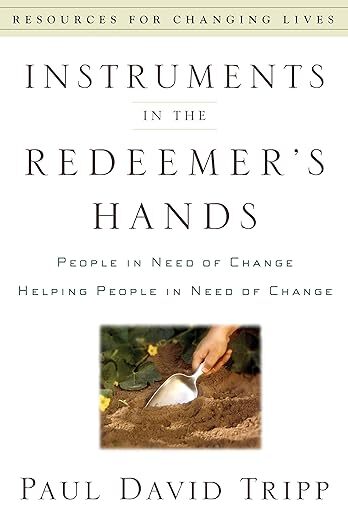
INSTRUMENTS IN THE REDEEMER'S HANDS
MEETING 1:
Discussion Questions:
- What does it mean to be an instrument of God?
- Who is called to be an instrument of God? To who?
- Why is it necessary/important to be instruments of change for God? Why has God called us to this?
- What do these chapters teach us about God?
- About people?
- About sin?
- How would you define/describe biblical personal ministry? What is the goal? How is this informed by everything we have been talking about here?
MEETING 2:
Discussion Questions:
4 ways to love that promote God's work of heart change:
- Enter their world.
- What is an entry gate?
- Why is it important to look for entry gates? What happens if we try to enter someone's world without looking for entry gates?
- Incarnate the love of Christ.
- What does it mean to incarnate the love of Christ?
- Why is it so important?
- What happens if we try to do ministry without incarnating the love of Christ?
- Identify with suffering.
- Why is suffering such an important part of the Christian walk? What are some of the fruits we often see in the midst of/on the other side of suffering?
- How can we encourage someone in their suffering? What truths can bring comfort and hope to a person in the midst of suffering?
- Accept with agenda.
- What does it mean to accept someone with agenda?
- How can we encourage others to move forward and pursue change?
MEETING 3:
Discussion Questions:
- What are some of the most common obstacles we have to knowing one another deeply and being able to personally minister to each other?
- What are some of the reasons/excuses you personally struggle with in developing deeper relationships? How can we begin to overcome these obstacles?
- As we seek to process what people share with us, what is required of us in order to incarnate Christ and minister biblically to them? What process do we need to go through before responding to them?
- Case studies on page 188-189, 191-194
- Organize the information given to you:
- What is/was going on? (Situation)
- What does the person do in response to what is going on? (Response)
- What does the person think about what is going on? (Thoughts)
- What does the person want out of what is going on? (Motives)
- Organize the information given to you:
MEETING 4:
Discussion Questions:
- Can you do biblical personal ministry without confrontation? Why or why not?
- How is confrontation an act of worship and love? In what ways is it actually sinful for us to fail to confront someone?
- What is the goal of confrontation?
- What are some necessary components of biblical confrontation?
- What are some helpful things to remember as we confront someone about their sin?
- Case study on page 222-227
- Talk through the following steps:
- Consideration: What does this person need to see (about himself, God, others, life, truth, change) that he can't see, and how can I help him see it?
- Confession: What does God want the person to admit and confess?
- Commitment: To what new ways of living is God calling this person?
- Change: How should these new commitments be applied in daily living?
- Talk through the following steps:
MEETING 5:
Discussion Questions:
- What steps can we take to help people change in light of the truths they've previously discovered about themselves?
- What does accountability look like?
- Who do we provide accountability for?
